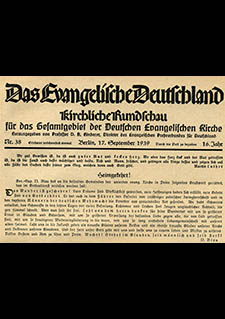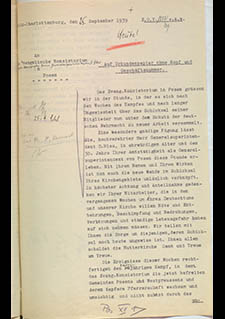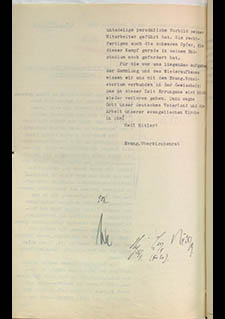“Return to the Reich”
The cessations of territory imposed by the Treaty of Versailles were rescinded after the invasion of Poland. First and foremost were West Prussia and Posen but also the border regions of Upper Silesia, Masuria and Warnia as well as Lower Silesian and Eastern Pomeranian districts, some of which had been separated from the German Reich after plebiscites.
Even after massive migration into the Reich, a good half a million Germans, the majority of them Protestants, still lived in the Polish territories (not including Danzig). Once Poland had been defeated, the western part of country was incorporated into the German Reich – directly and no longer as a province of Prussia – before 1939 was out. The former Prussian province of West Prussia was enlarged with territories predominantly populated by Poles at the time and the area around the city of Danzig became the “Gau Danzig-West Prussia” with the administrative districts of Danzig, Bromberg and Marienwerder.
Albert Forster, previously Head of Civil Administration, became the Gau’s governor. The military district of Posen to the south became the “Reichsgau Wartheland” with the administrative districts of Hohensalza, Posen und Litzmannstadt; Arthur Greiser became Reich Governor of the Wartegau.
Although the parishes in these territories had formed into a church of their own after their split from the Evangelical Church of the Old Prussian Union, they had maintained close contact with the “mother church”. The United Evangelical Church in Poland was headed by General Superintendent Paul Blau; its consistory was located in Posen.
The Prussian High Consistory Ministry’s to formerly German, then Polish citizens on the one hand and the increasing formation a Catholic Polish identity and a suitable policy toward minorities on the other hand precipitated political upheavals and heightened the denominational churches’ national polarization. The Protestants’ situation was anything but free of conflict.
The consistory of Posen had therefore expressed its jubilance over the German victory in September of 1939. An appeal proclaimed: The miracle has occurred! Your dreams have become reality, your hopes have been fulfilled, your prayers have been heard by God. He sent you the liberator from twenty years of Polish tyranny in the Führer and saviors from dreadful adversity in the brave men of the German Wehrmacht (quoted in: Hermle, Thierfelder, Herausgefordert, p. 572). The consistory of Posen and the Prussian High Consistory exchanged greetings and mutually reassured one another of their continuing close ties.
Once the “Reichsgau Wartheland” had been formed, the German Evangelical Church and the Evangelical Church of the Old Prussian Union attempted to have Protestants there rejoin their church. They were not allowed to do this, however, despite support from the Ministry of Church Affairs. The Wartheland was supposed to be reorganized as a “model Gau”, which no longer recognized any churches in the sense guaranteed by state church law. This became clear when Reich Governor Arthur Greiser orally presented his “Thirteen Points on the Separation of Church and State” to representatives of the church on March 14, 1940.
Among other things, these stated: 1. There are no longer any churches in the state sense; instead, there are only religious church societies in the sense of associations. 2. Leadership does not lie in the hands of authorities, but rather of association presidents. 3. For this reason, there are no longer any laws, decrees and directives in these domains. 4. Relationships with groups outside of the Gau no longer exist, nor do any legal, financial or official ties to the Reich Church. 5. Only legal adults can become members by stating so in writing. They are thus not born into membership, but rather must declare their wish to join only when they come of legal age. There are no regional, people’s or territorial churches. Anyone moving from the Altreich to the Warthegau also has to be reregistered in writing first (Ibid., p. 574).
Source / title
- Greeting: © Ev. Arbeitsgemeinschaft für Kirchl. Zeitgeschichte; Letter: © Ev. Zentralarchiv in Berlin, 7/18681.



